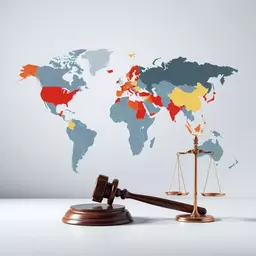Appealing Extradition Requests in UAE

Understanding the extradition process is critical, especially given how complex and nuanced it can be. With various legal frameworks and implications to consider, being well-informed can significantly impact your case. The UAE's approach balances international obligations with the protection of individual rights, making it vital for anyone involved in an extradition matter to stay updated and seek knowledgeable legal assistance.
What You Will Learn
- Key legal frameworks governing extradition in the UAE include Federal Law No. 39 of 2006 and various international treaties.
- The UAE judicial system plays a crucial role in extradition decisions, emphasizing procedural fairness and the rights of individuals.
- Understanding the UAE Federal Criminal Procedure Law is essential for knowing your rights and the timeline for extradition requests.
- Familiarity with which UAE court will handle your case can inform your legal strategy and preparation.
- Utilizing practical resources, such as sample forms and checklists, can streamline the extradition appeal process.
- If your appeal is denied, options like cassation and diplomatic intervention may be available to you.
- Extradition can significantly impact your immigration status in the UAE, including potential deportation and future residency applications.
Key Aspects of the Extradition Process in the UAE
Understanding the extradition process involves several critical components, which are outlined below. For a deeper dive into the foundational laws, you can explore extradition laws in the UAE.
Federal Law No. 39 of 2006
This law provides the framework for extradition requests, ensuring international cooperation.
Judicial Oversight
UAE courts, alongside the Public Prosecutor's office, ensure fair review of extradition requests.
Rights Under the UAE Federal Criminal Procedure Law
Individuals have specific rights during extradition proceedings, including timelines for responses.
Court System Roles
The Dubai and Abu Dhabi courts have specialized divisions to handle extradition cases effectively.
Understanding the Extradition Process in the UAE
Overview of Extradition Laws in the UAE
Extradition laws in the UAE are primarily governed by Federal Law No. 39 of 2006, which outlines the legal framework for extradition requests. This law sets the groundwork for international cooperation, ensuring that extradition occurs in a structured and lawful manner. Additionally, the UAE has entered into various international treaties that further define the scope and processes involved in extradition.
These treaties play a critical role, as they often dictate the terms under which individuals can be extradited. They may include provisions on the type of offenses that qualify for extradition and establish protocols for the handling of requests from other nations. Understanding these legal nuances is vital for individuals facing extradition, as it can influence their defense strategy.
- Federal Law No. 39 of 2006
- International treaties with various countries
- Specific offenses outlined for extradition
Judicial Role in Extradition Decisions
The judicial system in the UAE plays a significant part in making extradition decisions. The UAE courts, alongside the Public Prosecutor's office, ensure that the extradition process adheres to legal standards. This ensures that each case is reviewed fairly, allowing individuals the opportunity to contest their extradition. For more information on navigating these processes, consider learning about navigating Interpol Red Notices legal defense.
It’s essential to note that procedural fairness is a cornerstone of the UAE's judicial approach. Courts will assess the legitimacy of the extradition request, weighing factors such as the nature of the charges and the potential consequences for the individual involved. This judicial oversight helps maintain a balance between international obligations and the protection of individual rights.
- UAE courts' role in reviewing extradition requests
- Public Prosecutor's involvement in the process
- Emphasis on procedural fairness and individual rights
UAE Federal Criminal Procedure Law and Its Impact
The UAE Federal Criminal Procedure Law significantly influences the extradition process by outlining the rights and procedures for individuals facing extradition. This law ensures that extradition requests are not only handled efficiently but also in accordance with established legal norms.
Key aspects of the law include the timeline for responding to extradition requests and the rights of the individuals involved during the proceedings. It's important for anyone facing extradition to be aware of these legal provisions, as they can affect the outcome of their case. Knowledge of the Federal Criminal Procedure Law can empower individuals to mount a more effective defense.
- Timeline for responding to extradition requests
- Rights of individuals under the law
- Legal norms governing extradition procedures
UAE Court System and Extradition Cases
In the UAE, the court system, particularly the Dubai Courts and Abu Dhabi Courts, is integral to handling extradition requests. Each court follows a structured process that includes reviewing evidence and hearing arguments from legal counsel. This systematic approach is essential for ensuring justice and upholding the law.
Both Dubai and Abu Dhabi courts have specialized divisions that focus on extradition matters, allowing them to address these complex cases with the attention they require. As a person facing extradition, understanding which court will oversee your case can be beneficial in preparing your legal strategy. Engaging with a knowledgeable legal team can help navigate the intricacies of the UAE's court system. If you need assistance, seeking guidance from criminal defense lawyers in Dubai could be a crucial step.
- Role of Dubai Courts in extradition cases
- Function of Abu Dhabi Courts in handling requests
- Specialized divisions for extradition matters
Pro Tip
Did you know? Engaging a legal representative who specializes in extradition can significantly enhance your chances of a favorable outcome. These professionals possess the expertise to navigate complex legal frameworks and can provide insights that may not be readily apparent to those unfamiliar with the system. Always consider obtaining specialized legal counsel as part of your strategy to address extradition challenges.
Practical Resources for Navigating the Extradition Appeal
Sample Forms and Checklists for Appeals
When facing an extradition appeal, having the right tools at your disposal can make all the difference. That's why I’ve compiled a selection of sample forms and checklists designed to streamline your preparation process. These resources not only clarify what needs to be submitted but also ensure that you stay organized during a potentially overwhelming time.
Here’s what you can expect to find in these resources:
- Sample Appeal Form: A template that outlines the essential elements needed in your appeal.
- Checklist for Documentation: A detailed list of all necessary documents required for the appeal.
- Timeline of Steps: A visual guide that helps track the appeal process and deadlines.
These tools are readily available for download on our website, Extradition Interpol UAE, to help you navigate your appeal with confidence!
FAQs Regarding Extradition Appeals in the UAE
Understanding the intricacies of the extradition appeal process can be daunting, but I’m here to help! Below are some common questions I often receive, along with their answers, to clarify any concerns you might have:
- What is the timeline for filing an appeal? You typically have 30 days from the date of the extradition request to file an appeal.
- Can I represent myself in an appeal? While it’s possible, seeking legal counsel is highly recommended for the best outcomes.
- What happens after I file my appeal? The court will review your application and notify you about the next steps in the process.
- What legal framework governs extradition in the UAE? Extradition is primarily governed by Federal Law No. 39 of 2006 and various international treaties.
- What is the role of UAE courts in extradition? UAE courts, along with the Public Prosecutor's office, ensure fair review of extradition requests and uphold procedural fairness.
- How does the UAE Federal Criminal Procedure Law impact extradition? It outlines the rights of individuals and timelines for responding to extradition requests, which are crucial for defense strategies.
- What are the post-appeal options if an extradition appeal is denied? Options include cassation, seeking diplomatic intervention, or re-evaluating the case with new evidence.
- How does extradition affect immigration status in the UAE? Extradition can lead to a review of immigration status, potential deportation, and impact future residency applications.
If you have more questions, don’t hesitate to check our website or reach out for personalized guidance!
Legal Resources UAE: Where to Find Help
When it comes to legal matters, especially ones as complex as extradition, knowing where to turn for help is vital. I’ve compiled a list of valuable legal resources that can assist you during your appeal process:
- Law Firms Specializing in Extradition: Look for firms with a strong track record in handling extradition cases.
- Legal Aid Organizations: These organizations offer support and representation for individuals who may not have the means for private counsel.
- Online Legal Platforms: Websites that connect you with legal professionals specializing in international law and extradition.
Finding the right help can make a significant difference in your case. At Extradition Interpol UAE, we're committed to connecting you with the resources you need to navigate this challenging process.
Post-Appeal Options and Next Steps
What Happens If Your Appeal is Denied?
If your extradition appeal does not succeed, it can be disheartening, but there are still options to consider. Understanding what comes next is crucial for your legal strategy. Here are some potential next steps:
- Cassation: This is a higher-level appeal that can be filed in certain circumstances if you believe there was a legal error in the initial decision.
- Seeking Diplomatic Intervention: In some cases, individuals may appeal to their home country's government for assistance.
- Re-evaluating Your Case: Consult with your legal team to explore any grounds for a fresh appeal or to assess new evidence.
Being proactive and informed about your options is key! If you find yourself in this situation, reaching out to a legal professional can provide you with critical insights and support.
Seeking Further Legal Recourse
Even after an extradition appeal, there may still be avenues for legal recourse available to you. Here’s a brief overview of options:
- Habeas Corpus: This legal action can be pursued to contest the legality of your detention.
- International Appeal: If applicable, you may consider appealing to international human rights bodies regarding your treatment or extradition.
- Review of New Evidence: If new evidence arises, you may be able to reopen your case based on this information.
Staying informed about your rights and options is vital. At Extradition Interpol UAE, we strive to empower individuals with knowledge and strategies for their defense during these challenging times.
Implications of Extradition on Immigration Law UAE
Understanding how extradition affects your immigration status in the UAE is crucial. The implications can vary depending on your specific circumstances, but here are some key points to consider:
- Status Review: Extradition proceedings can lead to a review of your immigration status.
- Potential Deportation: If extradited, you may face deportation following your legal proceedings.
- Impact on Future Immigration Applications: An extradition case can affect your ability to apply for residency or other immigration benefits in the UAE.
It’s important to consult with legal professionals who understand both extradition and immigration law. This knowledge can help you navigate the complexities of your situation effectively. For more detailed information on related topics, you can read about responding to an Interpol Red Notice.
Conclusion and Support Resources
Summary of Key Points on Extradition Appeals
In summary, navigating the extradition appeal process in the UAE requires careful attention to detail and a solid understanding of your rights and options. Key takeaways include:
- Utilizing available resources, such as sample forms and checklists.
- Understanding the importance of legal representation throughout the process.
- Being proactive about your next steps, regardless of the appeal outcome.
Remember, you don’t have to face this alone. At Extradition Interpol UAE, we’re dedicated to supporting individuals throughout their legal journeys, providing insights and resources every step of the way!
Call to Action: Seeking Legal Assistance
If you or someone you know is facing an extradition appeal, I urge you to consult with experienced legal professionals who can guide you through this challenging process. Don’t hesitate to reach out for support and assistance—empower yourself with knowledge and the right legal tools! For comprehensive guidance, consider reviewing international treaties and extradition.
Recap of Key Points
Here is a quick recap of the important points discussed in the article:
- Extradition Laws: Governed by Federal Law No. 39 of 2006 and various international treaties, outlining the legal framework and offenses that qualify for extradition.
- Judicial Oversight: UAE courts and the Public Prosecutor review extradition requests, ensuring procedural fairness and individual rights are protected.
- Federal Criminal Procedure Law: Influences the extradition process by outlining timelines and individual rights, crucial for effective defense strategies.
- Role of Courts: Dubai and Abu Dhabi courts have specialized divisions for extradition, ensuring a structured approach to handling cases.
- Resources for Appeals: Utilizing sample forms, checklists, and legal resources can streamline the extradition appeal process and improve outcomes.
- Post-Appeal Options: Understanding options like cassation, diplomatic intervention, and new evidence can help in developing further legal strategies.
- Immigration Implications: Extradition can impact immigration status, leading to potential deportation and affecting future applications for residency.



